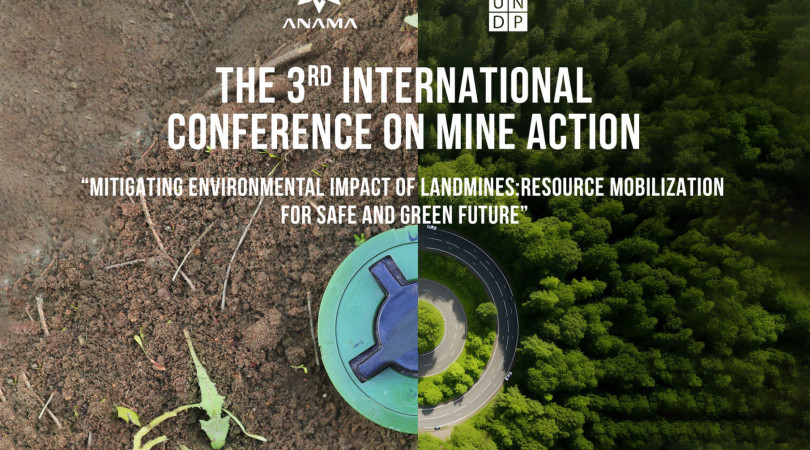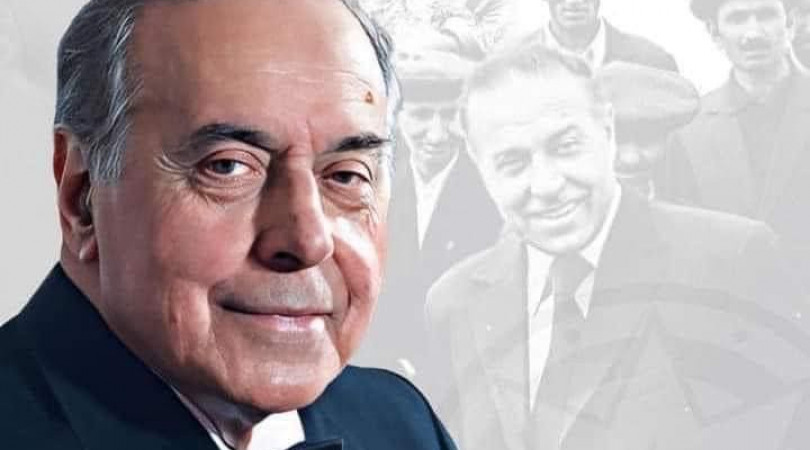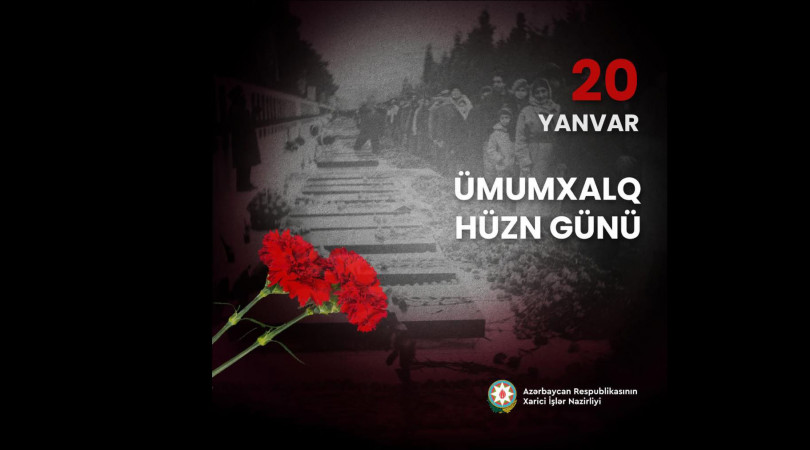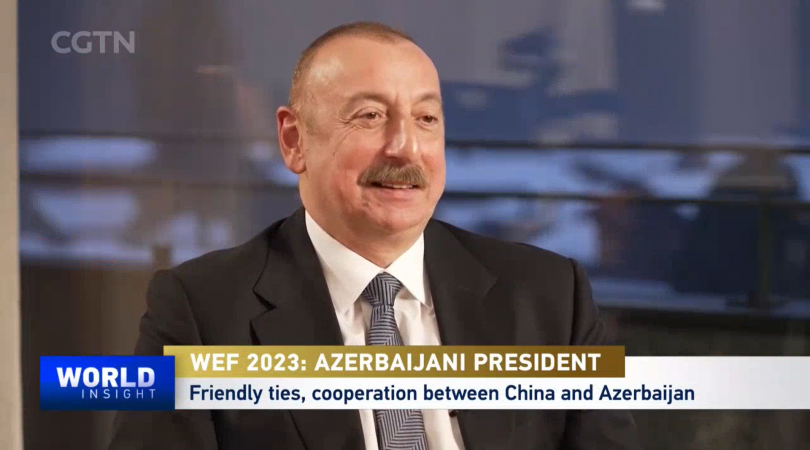Statement of the Ministry of Foreign Affairs of the Republic of Azerbaijan on the occasion of the 30th anniversary of the Khojaly genocide
February 26, 2022 marks the 30th anniversary of the Khojaly genocide committed by the armed forces of Armenia during the Armenian aggression against Azerbaijan.
One of the gravest crimes committed against the civilian population during the decades of Armenian aggression against Azerbaijan, and the most tragic page of the First Karabakh War, was the destruction of the city of Khojaly and the genocide of its inhabitants. Before the conflict, Khojaly, located in the Karabakh region of Azerbaijan, was a home to over 7,000 people: men, women, children, families.
From October 1991, the town was surrounded by the armed forces of Armenia. Overnight, on 25th February 1992, following massive artillery bombardment of Khojaly, the armed forces of Armenia, with the help of the former USSR infantry guards regiment No.366 of which the Armenians constituted the majority, forcibly seized control of Khojaly. Invaders destroyed the city and, with particular brutality, brought violence to its peaceful population.
5,379 inhabitants of the city were forcefully expelled. 613 people, including 63 children, 106 women and 70 elderly citizens, were brutally murdered. 1,275 were captured and taken hostage and were tortured, and 487 were injured. The fate of 150 of those captured, including 68 women and 26 children, remains unknown to this day. The actions of the armed forces of Armenia tore families apart. Eight families were left with no survivors to speak of. 130 children lost a parent, with a further 25 children left with no surviving parent at all.
The indiscriminate killings of civilians at Khojaly stemmed from a policy of ethnic hatred and racial discrimination against Azerbaijanis at the state level in Armenia. It led to the killing of innocent people based simply on their ethnicity. The crimes committed at Khojaly were an integral part of Armenia's policy of systematic violence against Azerbaijanis.
The Khojaly massacre and other crimes committed by Armenia in the course of its aggression against the Republic of Azerbaijan, including war crimes, crimes against humanity and genocide, constitute serious violations of international humanitarian and human rights law. These include violations of the Convention on the Prevention and Punishment of the Crime of Genocide; the Convention against Torture and Other Cruel, Inhuman or Degrading Treatment or Punishment; the International Convention on the Elimination of All Forms of Racial Discrimination and others.
So far, the national legislative bodies of 17 countries, as well as 24 States of the USA, the Organization of Islamic Cooperation and the Organization of Turkic States have adopted a number of resolutions and decisions condemning the massacre of civilians in Khojaly and characterizing it as a crime against humanity and an act of genocide.
In its judgment of 22 April 2010, the European Court of Human Rights arrived at an important conclusion with respect to the crimes committed in Khojaly, denouncing the behavior of those carrying out the atrocities as “acts of particular gravity which may amount to war crimes or crimes against humanity”.
Under international law, States have a responsibility to investigate atrocities such as those committed by Armenian forces at Khojaly and prosecute the perpetrators. However, to date none of those responsible for the crimes committed at Khojaly have been prosecuted by Armenia.
In a telling admission of culpability, Armenia’s then Defence Minister and ex-President, Serzh Sargsyan, was quoted by the British journalist Thomas de Waal, as saying, “before Khojali, the Azerbaijanis thought that ... the Armenians were people who could not raise their hand against the civilian population. We were able to break that [stereotype]” (Thomas de Waal, Black Garden: Armenia and Azerbaijan through Peace and War (New York and London, New York University Press, 2003), p. 172).
Deliberate targeting of the Azerbaijani civilian population continued during military operations conducted by Armenia from September 27 to November 10, 2020. Deliberately targeting the civilian population and civilian infrastructure of Azerbaijani cities such as Ganja, Barda, Terter, which are located at a considerable distance from the war zone, Armenia resorted to the same terror tactics as they had in 1992.This time with the use of modern types of armoured vehicles, rocket launchers and cluster munitions, Armenia once again unlawfully targeted and killed peaceful Azerbaijani civilians.
The Republic of Azerbaijan believes that continuous measures taken at the national level, as well as within the framework of existing international law, will serve to end impunity and bring to justice those responsible for serious crimes committed during Armenia's aggression against Azerbaijan.
We take this opportunity to remember the victims of the Khojaly massacre and commit their sacrifice to our collective national memory. May they rest in peace.
**********
阿塞拜疆外交部就霍贾利大屠杀30周年发表声明
2022年2月26日是霍贾利大屠杀满30周年纪念日,大屠杀发生在30年前亚美尼亚武装力量侵略阿塞拜疆期间。
霍贾利大屠杀是亚美尼亚侵略阿塞拜疆的十年间对平民犯下的最严重的罪行之一,也是第一次卡拉巴赫战争中最悲惨的一页:霍贾利城市被严重摧毁,并大量屠杀当地居民。冲突发生之前,阿塞拜疆卡拉巴赫地区的居民达7000多人:男人,妇女,儿童,家庭。
1991年10月起,整个城市被亚美尼亚武装力量包围。1992年2月25日夜间,在对霍贾利进行大规模炮击后,亚美尼亚武装力量在前苏联第366机动步枪团的帮助下占领了霍贾利,该步枪团组成人员大部分是亚美尼亚人。侵略者毁坏城市,且极其残暴的对平民进行了大屠杀。
5379人被强迫驱逐。613人其中包括63个儿童,106位妇女和70位老人被残忍杀害!1275人被俘虏并加以折磨,487人受伤。被俘虏的人当中有150人其中包括68名妇女和26位儿童至今下落不明。亚美尼亚武装部队的侵略行为造成很多家庭妻离子散。8个家庭的全部成员被杀害。130名儿童成为单亲家庭,25名儿童成为孤儿。
亚美尼亚完全不分青红皂白残忍杀害霍贾利平民的行为源于亚美尼亚国家层面对阿塞拜疆人的种族仇恨和歧视政策,这些无辜的人仅仅因种族属性而被杀害。在霍贾利犯下的罪行是亚美尼亚侵略期间实施的系统性暴行政策不可分割的一部分。
霍贾利大屠杀和亚美尼亚在侵略阿塞拜疆共和国期间犯下的其他罪行包括战争罪、危害人类罪和灭绝种族罪严重违犯了国际人道主义法和人权,其中包括违反《防止及惩治灭绝种族罪公约》、《禁止酷刑和其他残忍、不人道或有辱人格的待遇或处罚公约》、《消除一切形式种族歧视国际公约》和其他文件。
迄今为止,17个国家的国家立法机构以及美国的23个自治州、伊斯兰合作组织和突厥国家组织通过了一些决议和决定,谴责在霍贾利屠杀平民,并将其定性为危害人类罪和种族灭绝行为。
欧洲人权法院在2010年4月22日的裁决中就针对在霍贾利犯下的罪行得出了重要结论,谴责那些犯下暴行的人的行为是"可等同于战争罪或危害人类罪。”
依据国际法,各国有义务调查亚美尼亚军队在霍贾利犯下的暴行,并将亚美尼亚军队在霍贾利犯下罪行的肇事者绳之以法。 然而,迄今为止,没有任何一名亚美尼亚肇事者为在霍贾利犯下罪行而被绳之以法。
在亚美尼亚前总统兼国防部长谢尔日·萨尔基相的一次激情演讲中承认了所犯罪行,引自英国记者托马斯·德瓦尔的记载,萨尔基相说:“在霍贾利事件未发生之前,阿塞拜疆人认为亚美尼亚人不会对平民下手,我们打破了这种刻板印象”(托马斯·德瓦尔,黑色花园:亚美尼亚与阿塞拜疆跨过和平与战争(纽约和伦敦,纽约大学出版社,2003年),172页)。
亚美尼亚在2020年9月27日至11月10日的军事行动期间继续对阿塞拜疆平民进行蓄意攻击。 亚美尼亚故意轰炸离作战区相当远的阿塞拜疆的甘贾市,巴尔达市和特尔特尔市的民用基础设施和平民,采取了与1992年相同的恐怖战术。 这一次,使用现代化的装甲车,火箭发射器和集束弹药,亚美尼亚再次非法袭击和杀害和平的阿塞拜疆公民。
阿塞拜疆共和国认为国家成面采取的长期措施以及在国际法实施的框架下,亚美尼亚在侵略阿塞拜疆期间相关人员所犯下的严重罪行将被问责问罪。
我们向霍贾利大屠杀的遇难者致敬,这次大屠杀的鲜明记忆将永远保留在阿塞拜疆人民的民族意识中。愿逝者安息!


















